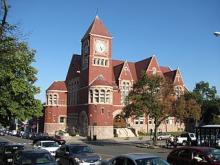In 2007, the City of Amherst, Massachusetts received a $150,000 grant from the Defense Advanced Research Projects Agency (DARPA) and the National Science Foundation (NSF) to build a wireless mesh network. DARPA and NSF have long been interested in developing mesh networks that are more resilient than traditional hub and spoke type networks.
The City IT Department, UMass Amherst Office of Information Technology Department, DARPA and NSF collaborated to deploy the network that now covers much of the city.
According to GazetteNet.com, the city is now investing another $50,000 to upgrade the system which now extends a mile through downtown. From the article:
“We definitely have the fastest and largest outdoor Wi-Fi network in the state,” said Information Technology Director Kristopher Pacunas.
The new system, which replaces aging equipment that was part of a smaller municipal Wi-Fi system, will be a boon to those who live, work and shop in downtown Amherst, said Pacunas, who anticipates as many as 2,000 different people will use the system daily.
“We’ve seen data in the short time we’ve had this (that) people will come to downtown areas with free Wi-Fi,” Pacunas said.
While the new upgrades were not officially launched until the start of 2013, Pacunas said that over 10,400 people used the system in the weeks leading up to the new year. Pacunas also notes that the network has limited functionality indoors, being designed mostly for public outdoor spaces downtown.
The Town of Amherst Public WiFi website describes how the design was meant to blend in with the look of the city and the light and utility poles that house the access points. There are 30 wireless mesh access points and burst speeds up to 80 Mbps. This is another example of how a municipal network can create direct benefits AND indirect benefits simply through its implementation. Also from the article:
Alex Krogh-Grabbe, director of the Amherst Business Improvement District, said he sees the benefits of the system.



